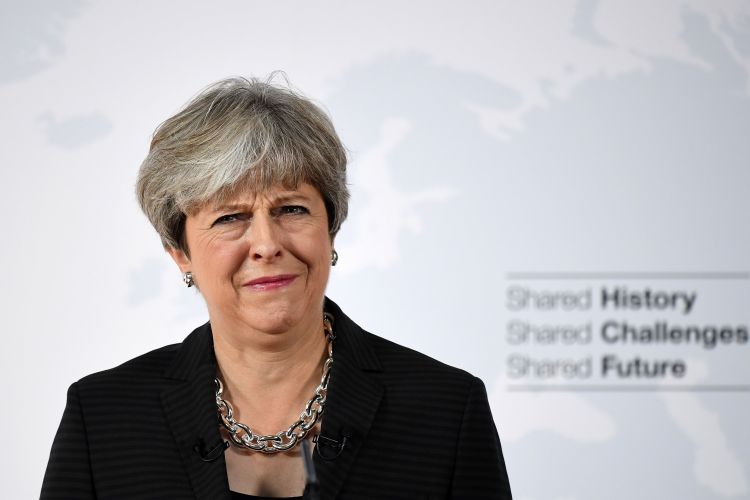Theresa May’s Florence speech didn’t go far enough – here’s why

The Prime Minister’s speech in Florence on Friday attempted to do three things: paper over the cracks in the cabinet; press the EU to move from ‘divorce’ talks to negotiations over the future UK-EU relationship; and set out a convincing and positive vision of post-Brexit Britain.
Unfortunately, she achieved none of these goals. And there was little to show that the tests trade unionists set out at Congress have even begun to be tackled.
Getting back to reality
But there are two silver linings in the clouds hanging over the Florence speech.
First, Theresa May finally committed to a transitional period after we leave the EU in March 2019, during which we’ll stay in the single market and customs union.
It’s something both the TUC and CBI have called for over the past few months, and Labour also adopted last month.
Second, she recognised that UK courts can’t have a monopoly over EU-UK issues. Once the transition is concluded, she said, UK courts will “be able to take into account the judgements of the European Court of Justice” on EU citizens' rights.
She also suggested that a new court will be needed, drawn from both the EU and the UK, to oversee disputes arising out of the new relationship.
Let’s end this foolish game
Unfortunately, her clarity on the transitional period – she said “the existing structure of EU rules and regulations” would remain in place – has now been clouded by her cabinet colleagues.
- Boris Johnson said that the UK would not be bound by new EU single market rules adopted during that period, and he told Czech radio that free movement would definitely end in March 2019 despite being part of ‘the existing structure of EU rules and regulations.*
- David Davis said that the UK would not be bound by ECJ decisions during that period, despite that being a condition of single market membership.
- Others have called for the UK to start negotiating trade deals during the transition (which isn’t possible), presumably just to keep Liam Fox occupied.
So, although the government’s position may now be what May said in Florence, there is still considerable disunity.
You can see why the EU chief negotiator wants to see the detail of the UK’s new negotiating positions before he advises European heads of government on whether the negotiations have gone far enough to justify moving on to the future relationship.
So, the Florence speech in itself probably failed in its aim of unjamming the negotiations on the UK’s future trade arrangements with the EU.
Back from a fantasy
The ‘offer’ made on the UK’s financial commitments was a step forward, but was hardly specific.
May essentially promised to keep paying towards the EU’s annual budget until the end of the current seven-year cycle, and to make further payments for other outstanding and continuing commitments.
The section of the speech on citizens’ rights did not take the debate much further forward, although May was for once positive about the impact of migration. She did, as mentioned, offer the possibility that UK courts would have regard to ECJ decisions in deciding on EU citizens’ rights – but that’s pretty mealy-mouthed, given the EU’s demand that EU citizens should be covered by ECJ decisions full stop.
And on Northern Ireland, while there were warm words again, and a commitment to no ‘physical infrastructure’ on the border, the Irish prime minister, Leo Varadkar, said that when he saw Theresa May on Monday:
“I pointed out that the best way to achieve that is for the United Kingdom and Northern Ireland to stay in some form of a customs union and some form of a single market.”
So, it’s probably the agreement to a transitional period under existing EU rules that will do more to unlock the next stage of negotiations May’s commitments on money, citizens’ rights or Northern Ireland.
Need a change, need a positive change
What about the convincing and positive vision of the future UK-EU relationship? Well, it was more of the ‘have cake and eat it’ wishful thinking, which led some (eg Cable and Mandelson) to suggest that she was merely kicking the can down the road.
A sensible transitional period, if she can get it through Conservative Party conference and her cabinet critics, followed by the same old fantasy.
While she repeated her Lancaster House admission that leaving the EU must mean giving something up, she yet again failed to set out for the British public the compromises and trade-offs that will be required.
And while she reiterated her pledge to improve workers’ rights, saying the British people would not tolerate “exploitative working practices”, she has done nothing about those issues since becoming Prime Minister.
There was nothing in the speech about how workers’ rights would be guaranteed, and nothing about what will be done to protect or replace the jobs lost if exports suffer and imports become more problematic.
That’s why Frances O’Grady said that we’re still waiting on a realistic negotiating strategy from the government, in order to get a long-term deal that protects jobs, rights and livelihoods.
And why Unite leader Len McCluskey complained that she had missed an opportunity to tell working people that their jobs and living standards would be protected.
Pretty much the only positive thing we can say about the speech – apart from stating the obvious about a transitional period – is that it leaves plenty of room for improvement!
* although as I have argued before, that doesn’t have to mean the unfettered, unregulated, free market free movement that successive British governments have chosen.
Stay Updated
Want to hear about our latest news and blogs?
Sign up now to get it straight to your inbox

